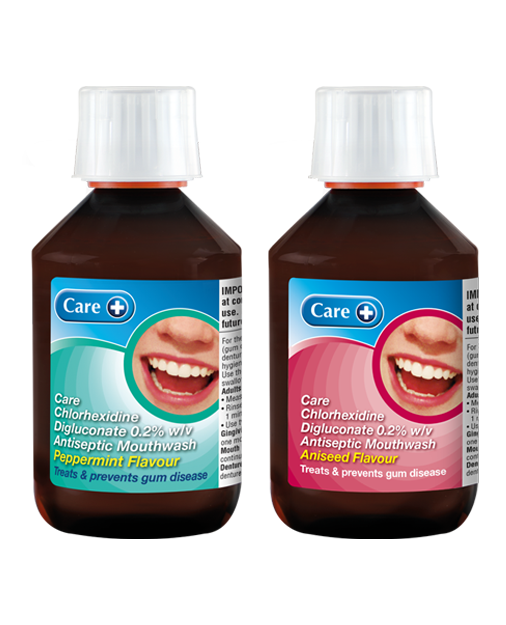Care Chlorhexidine Digluconate 0.2% w/v Antiseptic Mouthwash helps treat and prevent gum disease (gingivitis). It can also be used to treat recurring mouth ulcers, oral thrush, denture sores or simply for maintaining good oral hygiene. It contains Chlorhexidine Digluconate, a disinfectant and antiseptic, to reduce the formation of dental plaque and fight infection in the mouth.

Care Chlorhexidine Digluconate 0.2% w/v Antiseptic Mouthwash Peppermint Flavour and Care Chlorhexidine Digluconate 0.2%w.v Antiseptic Mouthwash Aniseed Flavour. Aids prevention of dental plaque formation. Aids treatment and prevention of gingivitis. Maintains oral hygiene. Promotes gingival healing following periodontal surgery. Management of recurrent oral ulceration and treatment of denture stomatitis and oral thrush. Contains Chlorhexidine Digluconate. Always read the label.
Measure 10ml in the cup provided, rinse the mouth for about 1 minute, then spit out. Use twice a day.
Gingivitis (gum disease) – use as above for one month.
Mouth ulcers and thrush – use as above, continuing for 2 days after symptoms go.
Denture sores – use as above, also soak dentures for 15 minutes, twice a day.
See the product label for more information or view the Patient Information Leaflet.
This is the leaflet included in the pack with a medicine. It gives information about taking or using a medicine. It is possible that the leaflet in your medicine pack may differ from this version because it may have been updated since your medicine was packaged.
If in doubt, always talk to a healthcare professional.
The best way to treat gum disease is to practise good oral hygiene.
This includes:
Who can use this product:
It can be used by adults, the elderly and children. Should only be used during pregnancy and breastfeeding if advised by a doctor. Medicines can affect the unborn baby. Always talk to your doctor or pharmacist before taking any medicine in pregnancy.
Gum disease is a very common condition where the gums become swollen, sore or infected.
Most adults in the UK have gum disease to some degree, and most people experience it at least once. It’s much less common in children.